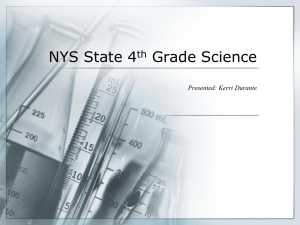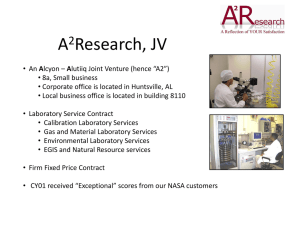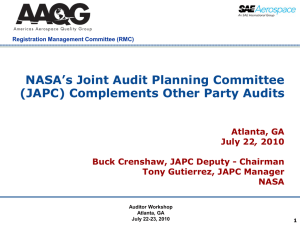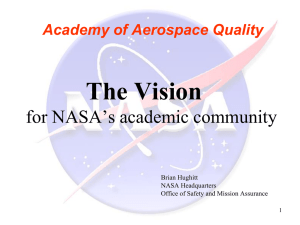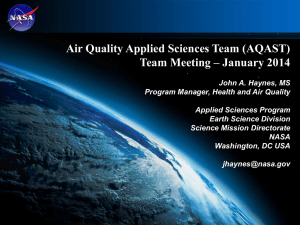Presentation Title Will Appear Here
advertisement
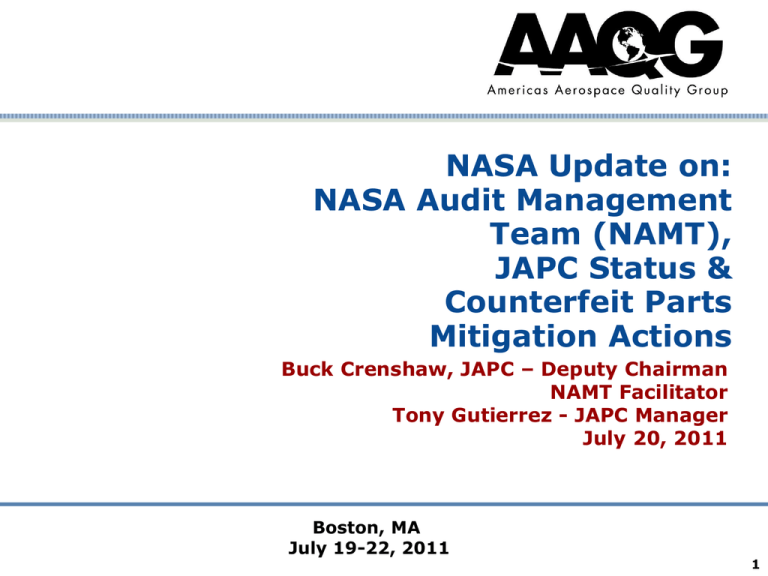
NASA Update on: NASA Audit Management Team (NAMT), JAPC Status & Counterfeit Parts Mitigation Actions Buck Crenshaw, JAPC – Deputy Chairman NAMT Facilitator Tony Gutierrez - JAPC Manager July 20, 2011 Company Confidential Boston, MA July 19-22, 2011 1 NAMT use of ICOP scheme • If a Center is AS9100 certified by an accredited third party, there is no need for a QAAR (or even a 1st party internal audit for that matter) to verify compliance with every single AS9100 requirement. All requirements are not equally important, and it is a poor use of NASA QA resources to be revalidating compliance with non-essential QMS requirements that registrars are already looking at versus validating compliance with important non-AS9100 Quality requirements. I would even go as far as to cite 100% duplication of registrar audits as a violation of NPD 8730.5 risk-base QA. Note that QAAR audits are already looking at reduced scope AS9100 attributes. • Having a NASA auditor present during 3rd party audits makes great sense. 2 NAMT use of ICOP scheme Background •Several NASA requirements documents have been published for the purpose of providing NASA Headquarters insight into NASA Field Centers, NASA Major Primes, and NASA’s Sub-Tier Suppliers. The process for oversight in the Sub-Tier Supplier is additionally clarified in a Memorandum of Agreement (MOA) that implements the NASA Joint Audit Planning Committee. This MOA establishes an integrated schedule and addresses team membership and methods of operation for the conduct of the audits of these Sub-Tier Suppliers. •The purpose of the NASA Audit Management Team is to accomplish the same functions as the JAPC does for Sub-Tier Suppliers for the NASA Field Centers and NASA Primes. 3 NAMT use of ICOP scheme • NAMT is a Government Team to provide NASA Management and NASA Field Centers insight into the compliance to appropriate Safety and Mission Assurance (SMA) Requirements at the NASA Field Centers and compliance to contractually imposed SMA Requirements at NASA Primes. 4 JAPC HIGH RISK QUALITY SYSTEM ELEMENTS QUALITY MANAGEMENT SYSTEM 4.1 Control of outsourced processes Configuration Management 5 JAPC HIGH RISK QUALITY SYSTEM ELEMENTS PRODUCT REALIZATION 7. Identification and Inspection of Key Characteristics Supplier Quality Management (Purchasing) Process control Documentation of processes Control of key characteristics In process verification points Criteria for workmanship Validation, Monitoring, and Measurement of Special Processes Identification of Monitoring/Measurement Status Traceability of Product to Records of Objective Quality Evidence Preservation of Product / Work Environment Electrostatic Discharge Foreign Object Debris/Damage Cleanliness 6 JAPC HIGH RISK QUALITY SYSTEM ELEMENTS MEASUREMENT, ANALYSIS AND IMPROVEMENT 8. Internal Audit Monitoring, Measurement, and Control of Key Characteristics Control of Nonconforming Product Corrective Action 7 JAPC HIGH RISK QUALITY SYSTEM ELEMENTS FROM AS9100C Customer Focus/Satisfaction (5.2 & 8.2.1) Information to be monitored and used for the evaluation of customer satisfaction shall include, but is not limited to: » product conformity » on-time delivery performance » customer complaints » corrective action requests. Organizations shall develop and implement plans for customer satisfaction improvement that address deficiencies identified by these evaluations, and assess the effectiveness of the results. (8.2.1) 8 JAPC HIGH RISK QUALITY SYSTEM ELEMENTS FROM AS9100C QMS General requirements (4.1) The organization’s QMS shall address customer and applicable statutory and regulatory QMS requirements Customer Focus/Satisfaction (5.2) Top management shall ensure that product conformity and on-time delivery performance are measured and that appropriate action is taken if planned results are not, or will not be, achieved. 9 JAPC HIGH RISK QUALITY SYSTEM ELEMENTS FROM AS9100C Project Management (7.1.1) Addition: New requirement for planning and managing product realization in a structured and controlled way to meet requirements at acceptable risk, within resource and schedule constraints. Implementation/Audit Considerations: Does the organization have a process to manage product realization planning to ensure quality and schedule are not compromised? – How are project plans used to manage the successful completion of projects? 10 JAPC HIGH RISK QUALITY SYSTEM ELEMENTS FROM AS9100C Risk Management (7.1.2) Addition: New requirement to implement a risk management process applicable to the product and organization covering: responsibility, criteria, mitigation and acceptance. Implementation/Audit Considerations: Does the organization have a risk management process that addresses all of the applicable requirements? –Is the definition of risk appropriately understood and applied in that process? –Are risks successfully managed in the organization? 11 JAPC HIGH RISK QUALITY SYSTEM ELEMENTS FROM AS9100C Configuration Management (7.1.3) Focuses configuration management on the product and how it is sustained throughout product realization 12 JAPC HIGH RISK QUALITY SYSTEM ELEMENTS FROM AS9100C Approval status for suppliers (7.4.1) Revision: Added and provided examples of “approval status” (e.g. approved, conditional, disapproved) and examples of “scope of approval” (e.g. product type, process family). 13 JAPC HIGH RISK QUALITY SYSTEM ELEMENTS FROM AS9100C Approval status for suppliers (7.4.1) Revision: Added and provided examples of “approval status” (e.g. approved, conditional, disapproved) and examples of “scope of approval” (e.g. product type, process family). The organization must define the process for suppliers approval status decisions or changes. Recognition that the industry trend is to use externally provided supplier performance data (e.g. Online Aerospace Supplier Information System –OASIS, Nadcap) 14 JAPC HIGH RISK QUALITY SYSTEM ELEMENTS FROM AS9100C Production Process Verification (7.5.1.1) Requirement to verify the production processes, documentation and tooling are capable of producing parts and assemblies that meet requirements. This process shall be repeated when changes occur that invalidate the original results(e.g. engineering or manufacturing processes changes, tooling changes). 15 Joint Audit Planning Committee (JAPC) status • As a consequence of any CB exceeding triggers and being asked for a corrective action plan to the RMC the JAPC will conduct a supplemental oversight audit in conjunction with any JAPC 2nd party audit scheduled during the following year. • Several JAPC audits currently in coordination phase. • Significant activity as NASA transitions from the Shuttle and Station assemble to commercial space services. • Significant issues as it relates to our NASA developed Heavy Lift launcher. • AAQG Space Forum has invited all of the Commercial Space companies issued contracts to our next AAQG Space Forum meeting in Long Beach in September. 16 Joint Audit Planning Committee (JAPC) status • A goal has been established to have most NASA auditors complete the AATT course. To date AATT has been conducted at GSFC, GRC and JSC. A course has been scheduled for KSC including DCMA personnel in September. • If funding is available we intend to make AATT available to JAPC members. • The JAPC and NMAT is considering using some of the standardized forms in AS9101D. • The intention of both the NAMT and JAPC is to input audit data into OASIS. 17 Counterfeit Parts Issue 111TH Congress - 2D Session - S. 3729 • AN ACT to authorize the programs of the National Aeronautics and Space Administration for fiscal years 2011 through 2013, and for other purposes • S.3729 Congressional Authorization Bill for FY2011 through 2013 requires that counterfeit part identification training be established for all employees that procure, process, distribute, and install electronic parts that will: – (A) teach employees how to identify counterfeit parts; – (B) educate employees on procedures to follow if they suspect a part is counterfeit; – (C) regularly update employees on new threats, identification techniques, and reporting requirements; and integrate industry associations, manufacturers, suppliers, and other Federal agencies, as appropriate… 18 111TH Congress - 2D Session - S. 3729 (cont.) • REQUIREMENTS.—In carrying out the program, the Administrator shall establish: – counterfeit part identification training for all employees that procure, process, distribute, and install electronic parts … – an internal database to track all suspected and confirmed counterfeit electronic parts … – a mechanism to report all information on suspected and confirmed counterfeit electronic parts to law enforcement agencies, industry associations, and other databases, and to issue bulletins to industry … • REPORT TO CONGRESS.—Within one year after the date of enactment of this Act, the Administrator shall report on the progress of implementing this section to the appropriate committees of Congress. 19 NPD 8730.2C, NASA Parts Policy • ATTACHMENT B: Counterfeit Parts Control Plan Contents – Assess potential sources of supply to determine the risk of receiving non-authentic parts... – Mitigate risks of procuring counterfeit parts from sources other than OCMs or authorized suppliers. – Include applicable contract/purchase order quality requirements related to counterfeit parts prevention. Examples of quality requirements are provided in AS5553, including: … – Specify contractor flow down of applicable counterfeit parts prevention requirements to their subcontractors. 20 NPD 8730.2C, NASA Parts Policy (Cont.) • Product Assurance Process: Assess potential sources of supply to determine the risk of receiving non-authentic parts... Also, ensure Material control and disposition. • Report nonconforming, defective, and/or suspected counterfeit for all cases involving counterfeit parts or other potential fraud, to the NASA Office of Inspector General and the NASA Director. • Counterfeit Parts Training provided to-date: FY11 NASA Center CF Parts Control Plans – October GSFC Drafted – December GRC Released – February DFRC Pre-Draft – March KSC – April SSC – May GSFC – June JSC 21 SAE G-19 Members from Government, Defense and Industry Sectors Aero Engine Controls American Electronic Resource Analytical Alternatives Analytical Solutions Applied DNA Sciences Arcadia Components Ares Corp Arrow Electronics Astute Electronics BAE Systems (Operations) BAE Systems Ball Aerospace & Technologies Boeing Boeing Advanced Systems Business Quality Process Management Bechtel Plant Machinery CALCE University Of Maryland Celestica Corp. Technology & Engineering China Aero-Polytechnology Establishment Creative Electron Crestwood Technology Group DA-Tech Derf Electronics Det Nortske Veritas (DNV) DPA Components International Celestica Corp. Technology & Engineering China Aero-Polytechnology Establishment Creative Electron Crestwood Technology Group DA-Tech Derf Electronics Det Nortske Veritas (DNV) DPA Components International Electronic Supply Chain Solutions Eltek Semiconductors General Dynamics General Dynamics UK GE Aviation Glenbrook Technologies Goodrich Control Systems Greenberg & Bass Harris Hi-Reliability Microelectronics Hi-Rel Laboratories Honeywell Aerospace Electronic Systems Honeywell Int'l Honeywell Technology Solutions Infineon Technologies AG Integra Technologies Jabil Circuits Jacobs Engineering Jet Propulsion Laboratory L-3 Communications - CSW Left Coast Technical Solutions Lockheed Martin Aeronautics Lockheed Martin Missiles & Fire Control 3M Microram Electronics Motronics Circuits International Mouser Electronics Nisene Technology Group Northrop Grumman Electronic Systems N.F. Smith & Associates NQA Northrop Grumman Orbital Sciences Plexus Premier Semiconductor Services Process Sciences Raytheon Rochester Electronics Sandia National Laboratories Schlumberger HPS Selex Galileo Silicon Cert Laboratories SMT Corp SolTec Electronics Sonix Sonoscan SRI International Sarnoff Star Associates International Trace Laboratories TTI 22 G-19 Subcommittees G-19 CI Continuous Improvement Subcommittee (AS5553A: Counterfeit Electronic Parts; Avoidance, Detection, Mitigation, and Disposition) G-19 D Distributor Subcommittee (AS6081: Counterfeit Electronic Parts; Avoidance Protocol, Distributors) G-19 Committee G-19 DR Distributor Risk Characterization Subcommittee (ARP6178: Counterfeit Electronic Parts; Tool for Risk Assessment of Distributors) G-19 A Test Laboratory Standards Development Subcommittee (AS6171: Test Methods Standard; Counterfeit Electronic Parts) G-19 C Standards Compliance Verification Subcommittee 23 Document Roadmap since AS5553 24 Questions? 25
